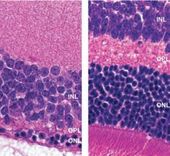
© Samson LaboratoryMIT researchers found that mice with normal DNA repair systems had more retinal degeneration upon exposure to environmental toxic agents than mice lacking a certain DNA repair system. At right, the cross section of the retina from a mouse lacking the repair system is normal. At left, mice with too much DNA repair have greatly reduced numbers of cells in the OPL (outer plexiform layer) and ONL (outer nuclear layer).
The research team found that relatively low-level exposure to an environmental toxic agent provoked very active DNA repair that led to surprisingly high rates of retinal degeneration in mice -- much higher than in mice lacking the same DNA repair pathway. The work raises the possibility of developing treatments for retinal degeneration by blocking a particular DNA repair pathway.
"Under some circumstances, too much DNA repair is not a good thing and could actually be a bad thing," said Leona Samson, co-director of MIT's Center for Environmental Health Sciences, professor of biology and biological engineering, and senior author of a paper on the work appearing online in the
Proceedings of the National Academy of Sciences this week.
